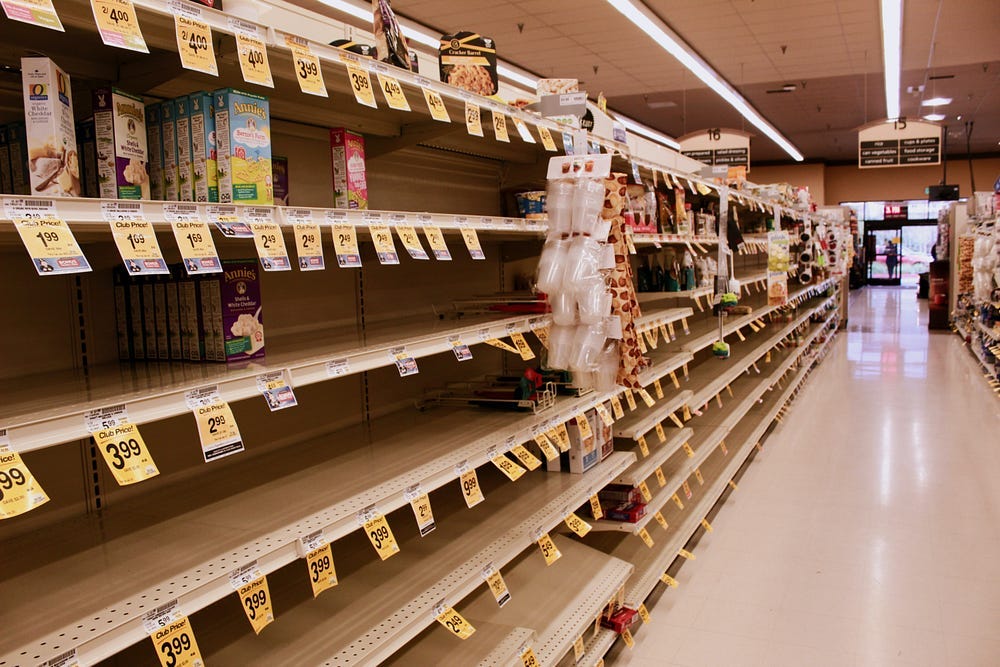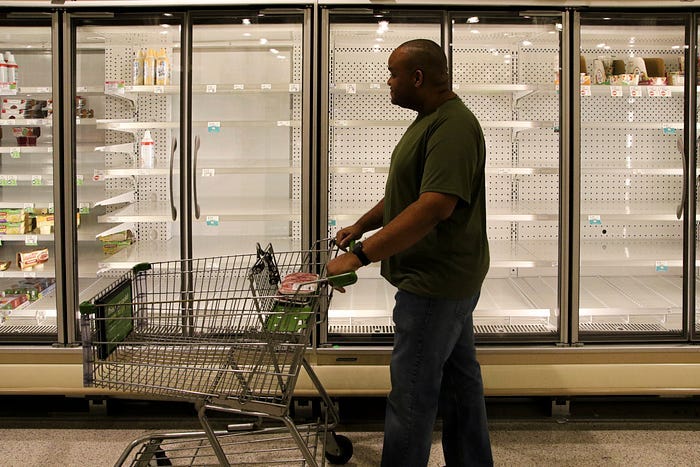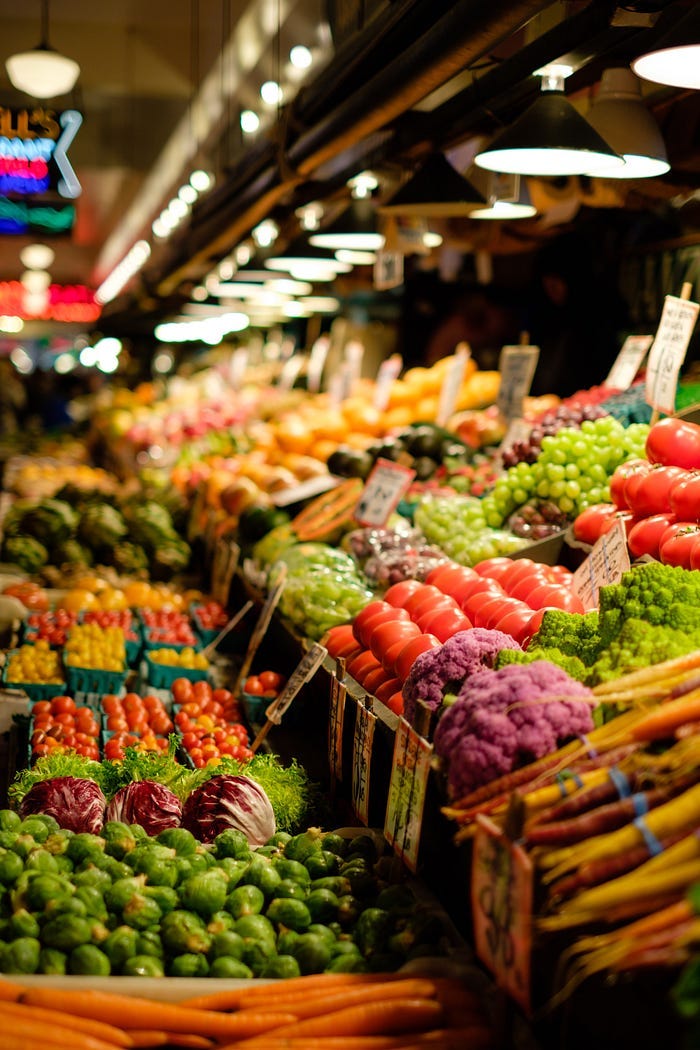What is a Food Desert, and How Can We Fix Them?
Fresh fruit and vegetables were my treat growing up

There were times growing up when my family had a rough time finding healthy food.
We were one of those families that seemed to slingshot from being okay financially to scraping the bottom of the barrel for spare change. There were times when I was a little girl when the only vegetables I saw were the ones my grandmother had growing in the backyard.
It was mostly just tomatoes. Which was fine by me, I freaking love tomatoes.
The kind of food you think of as a treat can be really different depending on what you eat growing up. I crave salad sometimes, crunching on lettuce and spinach and the brine of black olives and feta cheese… things I didn’t get to taste often when I was small.
Back then, I lived on hot dogs and rice. The occasional can of chicken soup, a lot of cheap casseroles made out of canned soup and noodles. Ground beef was all we got, and steak was never on the table.
At least those foods were available to us, though. We couldn’t afford them most days, but we could find them when the money came in.
A lot of people aren’t that lucky. Especially now, between tariffs and SNAP benefits getting the axe for so many. Even here in Canada, where I live, the poor are struggling to put food on the table. The troubles in the United States impact us, too.
For some, it’s not just an affordability issue; it’s that food is literally too far away for them to get to it.

Imagine living in a place where the nearest grocery store is miles away, and your only options for soothing your hunger are fast food or convenience store snacks.
Everywhere you look, all you can find is high-sugar, high-sodium food with no nutritional value at all. There isn’t much to it, and it certainly won’t keep you sated for very long. It’s a very poor quality fuel to keep your body running the way you need it to.
Imagine being constantly shamed for buying so-called ‘junk food’ instead of cooking good wholesome meals for your family, but you literally have no other option if you want to eat at all.
This is the daily reality for millions of people in poverty. We refer to these as food deserts — areas where access to affordable, healthy food options is limited or nonexistent. An uncomfortably large chunk of the United States population is currently eking out a living in food deserts.
Food deserts are always low-income neighbourhoods, where supply and demand just aren’t balanced enough to catch the eye of big businesses. Why would you build a nice grocery chain here? It’s unlikely anyone in the surrounding blocks is going to be able to afford what you’re selling.
To grocery chain owners, it’d be a waste of money to build in those neighborhoods. And that is, of course, the most important consideration in a capitalist society.
Money is always valued more highly than the lives and well-being of the poor.

In food deserts, fresh fruits and vegetables are a rare sight.
Diabetes and heart disease are extremely common, a side effect of poor nutritional value in the local diet. The human body can’t live off of frying oil and salt forever, not without breaking down.
The lack of a balanced diet can wreck not just the physical health of residents, but also their mental health and community morale.
There is nothing more disheartening than being unable to provide your family with a wholesome meal, knowing that you’re only making your health worse in the long run…but it’s either that or going to bed hungry.
Children growing up in food deserts are even worse off, facing higher risks of obesity and related health issues.
Kids are still growing, still actively developing both their bodies and minds. Malnutrition in their formative years can wreak havoc on everything from heart and lung health to bone structure, and even their educational outcomes.
Hungry kids really struggle to pay attention in class. They tend to lack energy, lose focus, and get easily demoralized. I mean, honestly — can you pay attention at work without lunch?
And that’s with the fortitude granted by adulthood!
Not only that, but there’s the constant shame of being poor, of being overweight, of not being able to eat healthy even if you want to. You will be treated as if it’s an intentional choice of yours to indulge in unhealthy food, and you will get no offers of help to eat better.
If you live in the U.S. through your childhood, you can’t even count on being fed at school. At least not without forking over money, or building up lunch debt if you can’t pay.
Yeah. Lunch debt. That’s a thing the good ol’ U.S.A. saddles children with.

Food deserts crop up for various reasons, but the biggest ones are rooted in the basic corporate virtue of hoarding every coin that you can find.
Supermarkets tend to be built in areas with higher economic status. That’s because they aren’t particularly profitable unless they’re exceedingly high-end, and low-income neighbourhoods just can’t spend enough to sustain them and their narrow profit margins.
Also, thanks to historically racist and segregationist urban planning, low-income communities tend to get the shaft anyway. Ever heard of Sacrifice Zones?
Some people are just considered expendable to the powers that be. Their health is not a priority.
To make matters worse, without public transportation, many people who live in food deserts are just kinda stuck there.
Cars are expensive to own, maintain, and fuel, so many low-income neighbourhoods have lower rates of car ownership. And calling a cab out of your neighbourhood to go grocery shopping can be just as pricey, especially with grocery store prices rising so steeply these days.
In my Canadian town, it costs me over $30 to take a taxi cab from my suburb to the downtown area. $60 for a round-trip grocery run, on top of the cost of the food? No, thank you. There’s absolutely no way I could afford to do that on my minimum-wage pay, even with my side hustles.
At least I have a job and I can live with family to save on rent temporarily. Without that, I’d be in serious trouble, as so many millions of people are.
Often, the question of what you’re putting on the table for dinner comes down to what happens to be within walking distance of your home, and what you can get for the cheapest price.
The price of ordering grocery deliveries can be just as cost-prohibitive.
For your health and wellbeing, the math just ain’t mathing.
And now, you can throw tariff-boosted food prices going through the roof, the massive cut to SNAP which is currently on the table, and the general inflation — in conjunction with mass layoffs and a generally unstable economy.
The United States is racking up problematic policies the way Dyatlov racked up bad decisions in Chernobyl. Every single choice has been a left, and it’s setting up for a grand explosion when the pressure goes too high.
Nobody is in good shape right now, but the poor and marginalized folks who are directly in Trump’s line of fire are in especially dire straights.
The poverty and homelessness rates for immigrants, people of colour and LGBTQ+ youth are well-documented. Things are getting worse for them, not better.

With all that in mind, I don’t want to paint a picture of everlasting doom. None of this is unsolvable, and there is hope of finding a suitable fix in just about every community.
It’s just a matter of public will, and it’s going to take a whole lot of marching feet and vocal outrage to make it happen. I’m not going to sugarcoat it; you’re up against some very powerful people who only care about their personal profits, so there’s a hell of a battle ahead.
And no pressure, but you in the U.S. carry the survival of hundreds of millions on your shoulders — from your own people, to those of us in Canada, to those around the world who depend on the now-dismantled USAID relief.
Trump letting USAID food rot instead of shipping it out is quite literally allowing children to die.
Still, there is some hope for individual people and families thanks to community networking and sustainability projects. Urban agriculture initiatives are turning vacant lots, backyards, and balconies into productive gardens all across the United States and Canada.
Movements like the Ron Finley Project, which was started by the gangster gardener himself. The man is an inspiration, and I strongly recommend watching his TEDtalk.
It’ll hit you like a punch in the gut, and I mean that in the best way possible.
Policy changes can create incentives for supermarkets to set up shop in underserved areas. Local governments could try subsidizing healthier food options, allowing people in food deserts to actually bring home fruits and vegetables once in a while.
I see a lot of conservatives out there shaming the poor for their buying habits, not realizing that people aren’t buying junk food because it’s all they want — it’s because it’s all they can afford to get.
If you can get two bags of chips for the price of a single apple, well… which one keeps you full longer?
Forcing the government to step up and make life easier is the goal. Gardening and providing food locally is important, but it’s no substitute for making the people in charge ‘Smarten the Fuck Up,’ as my mother would say.
Education is vital, too — people who grow up in food deserts often don’t get to learn much about cooking, or about the nutritional value of the food they eat. Even if they can later afford to buy ingredients for healthier meals, they might not know how to prepare them.
I know loads of people where I grew up have no idea how to make their own food, at least beyond shoving something quick in the microwave. Their parents never cooked at home, so they never got those lessons.
Learning how to cook doesn’t solve a lack of money, but it can help you be a little more creative with what you buy. Stretching cheap ingredients to keep you fed longer can help you save.
I grew up on the magic of macaroni noodles, canned tomatoes, ground beef and cheese from a can. You’d be surprised how much food you can make for cheap out of that.
Making a big pot of cheap pasta soup lasts a lot longer than five microwave meals, and homemade food is always lower on sodium and sugar than the pre-made stuff from the convenience store.
If you enjoy cooking, pass on the skill! If you know some people who never learned, invite them over for a cooking party. When I was a kid, I taught several of my friends how to make their own breakfast.
We made pancakes, eggs, and a giant mess in the kitchen. Best day ever. But they had fun, and they got a sense of confidence and pride in being able to just make their own meal when they were hungry.
It gave them more options, too. They didn’t need to go for a pre-made sandwich at the convencience store, they could buy milk and a box of pancake mix and feed themselves for a week instead of one meal for the day.
And besides, if you can afford to throw a cooking party, you can help out by sending folks home with leftovers. Lean into that community support angle, yeah?
Cooperation is our human superpower, we need to use it more often.
Living in a food desert is awful. It’s bad for your health, bad for your mind, and bad for the environment too. Long travel to buy food, an abundance of plastic waste from packaged foods, so on.
There are ways to put a stop to it, to improve the health and wellness of entire communities if we pull together to insist upon a better way of living.
It’s well within the power of the government to do something about this if they would bother to get off their asses and act. The active, intentional sabotage we’re seeing now is just plain evil.
After all, that’s the whole point of having a government in the first place. It exists to serve the interests of its people; that’s what democracy is. We are the boss, the government is made up of our employees.
Our job is to inform them when they’re doing a lousy job and tell them how we expect them to improve.
In the United States, they desperately don’t want you to do that. Why do you think Trump has National Guard troops all over the goddamn place right now? It isn’t because he’s so damn popular. It’s because he’s trying to take away that democracy, so you can’t tell him what to do.
We all know that one of the most terrifying things a government can face is a food riot.
Dictatorships and empires have been felled by the humble loaf of bread and a populace that was done putting up with having nothing on the dinner table.
Pulling together across our communities to demand a better standard of living is how we affect change. It’s how we build a better world for ourselves and for one another. But it only works if we take that stand together.
Don’t settle for cake when a wholesome loaf of bread is what you’re owed.
Solidarity wins.



You're absolutely right. I've been poor before, wondering if we could afford some cheap food to put on the table. I grew up poor on a working farm. If we didn't grow it, raise it or hunt it, we didn't eat.
In my adult years in the mid-1990's we were both working very low paying jobs, living in a small shabby house and trying to buy food on our last twenty dollars before the end of the week when one of us would get a paycheck.
There are a lot of Americans right now experiencing what I went through back then and the numbers are growing by leaps and bounds right now. Potential food riots are a thing in the near future. This winter, there will be some people who won't be able to afford to keep their homes warm anymore. It will either be that or go hungry.
Despite all of the euphoria of yesterdays election results, it doesn't change much for the people around the country yet. They're still going to the food banks and stocking up on donated used warm clothes to get through the winter and hoping that next year may be a little better for them. Meanwhile, how many seniors will die of hunger and hypothermia this winter as the rich politicians argue over ballrooms, bathrooms and ICE storm troopers?